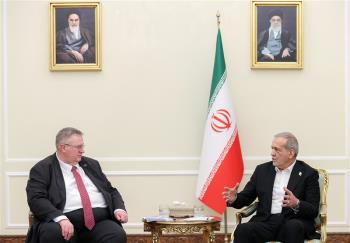Alwaght- Nigerians will vote for the country's president on February 14th while the country faces a vicious insurgency in the north ignited by Boko Haram Takfiri terrorists.
The group began its terrorist activities in 2009 in Maiduguri, the capital of Borno state, although it had been around since 2002. Its notorious leader, Abubakar Shekau, has appeared in video tapes, vowing to press ahead with the war against the government. Reports estimate that 13,000 people, Muslims and Christians, have died since Boko Haram launched its violent campaign.
Boko Haram has close resemblance to several Takfiri terrorists groups in the world such as ISIS, Taliban, Al Qaeda, and Al Shabab. It is believed to have a number of factions with differing aims, including some with political links. In fact Nigerian president Goodluck Jonathan has been compelled to deny insinuations that he is behind Boko Haram insisting that no sane leader can support insurgency in his own country.
There have been several reports that the Nigerian government of Goodluck Jonathan is providing protection to these terrorists. Successive Nigerian regimes have cracked down on Islamic movement leaders but when it comes to confronting such Takfiri criminals, there is hardly any tangible action. In a statement on May 9, Amnesty International accused the Nigerian regime of failing to take action even though it had prior warning of Boko Haram’s attack on a school in Chibok region where over 200 school girls were abducted.
“The fact that Nigerian security forces knew about Boko Haram’s impending raid, but failed to take the immediate action needed to stop it, will only amplify the national and international outcry at this horrific crime,” said Netsanet Belay, Amnesty International’s Africa Director, Research and Advocacy.
There are many Nigerians especially northerners who believe that the terrorist group Boko Haram is aided and abetted by the U.S. and Israeli regime-supported Jonathan regime in order to demonize Islam and Muslims.
The U.S./Israeli regime strategy of supporting Takfiri terrorists in Iraq, Syria, Afghanistan and other parts of the Muslim world is apparently being implemented in Nigeria. Boko Haram also espouses the Saudi-backed Wahhabi-Takfiri ideology blamed for tarnishing the image of Islam globally.
The unending insurgency in Nigeria has raised fears of Balkanization of the country just as has been witnessed in countries hit by Takfiri terrorism such as Mali, Libya, Syria, Iraq, and Afghanistan. Considering the fact that Boko Haram began as a northern separatist movement Balkanization is a foundational goal of the Takfiri group.
Nigeria is a Muslim majority country strategically located in Africa with a population of over 170 million, rich in oil and gas and a member of the Organization of Islamic Cooperation. Therefore, a divided and warring Nigeria ultimately serves the interests of the US and its allies.
The recent unusual visit to Nigeria by U.S. Secretary of State John Kerry amid a presidential campaign is a pointer to Washington's interference in the African state. With a few days left to the presidential elections, the ruling People's Democratic Party (PDP) led by President Goodluck Jonathan from the south is involved in an intense battle with the opposition All Progressive Congress (APC) whose candidate is former military Muhammadu Buhari. Apart from the serious security threat posed by Boko Haram Takfiri militants, the other major issues in the campaign are the economy which has been hit by the falling global oil prices.
Another key issue is rampant corruption that has demoralized and significantly weakened the once powerful Nigerian military thus making it unable to tackle Boko Haram. The escalation of Boko Haram's bloody campaign in northern Nigeria despite the presence of regional armies from Chad and Cameroon has raised legitimate concerns regarding the ability of a significant portion of Nigerian voters to participate in the upcoming presidential elections.
Reports indicate that there is possibility of disenfranchisement of up to 1.5 million voters displaced due to the bloody insurgency by Boko Haram. Such a situation could undermine the credibility of the elections outcome in an already deeply polarized nation. The fact that the opposition contender is a Muslim from the north and the incumbent president a Christian from the south raises the possibility of sectarian violence in case of contested results. Therefore whatever the outcome of the elections, the Boko Haram factor will certainly cast its shadow in the most populous African nation.



























